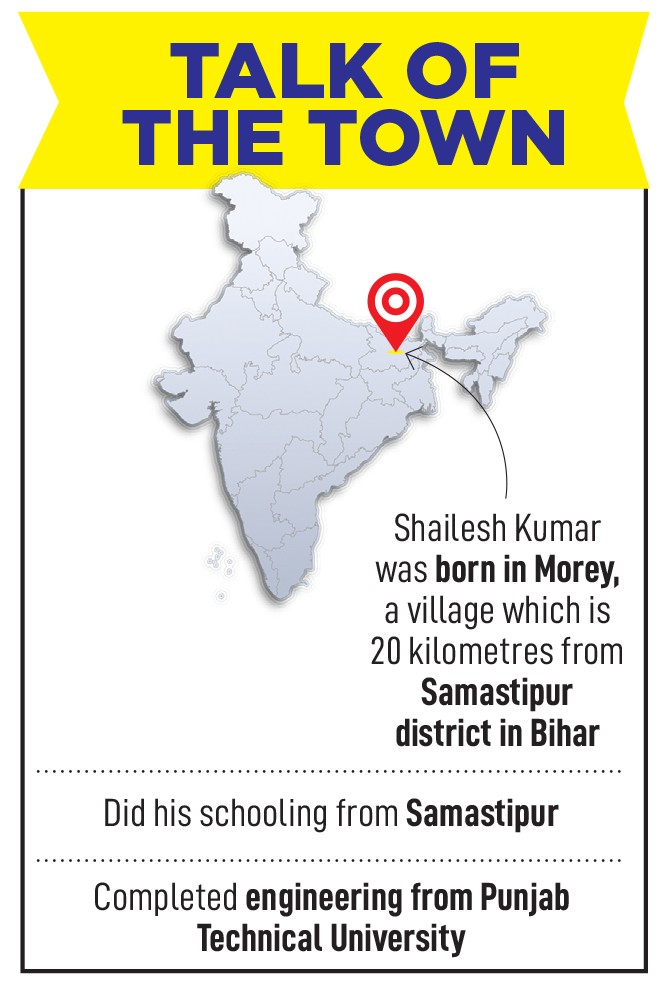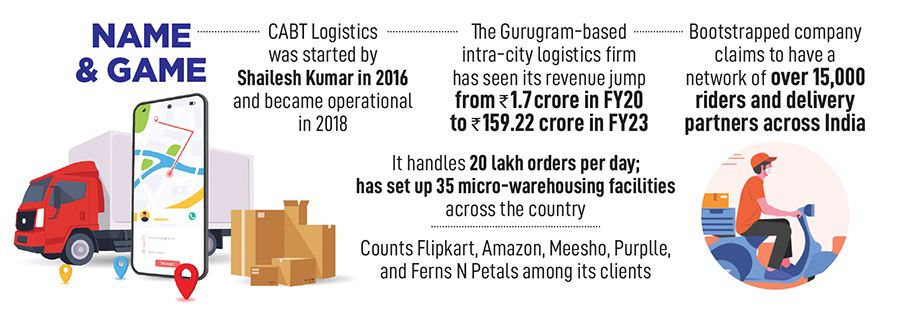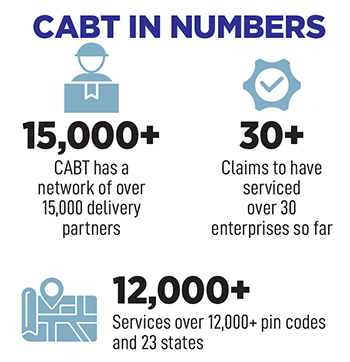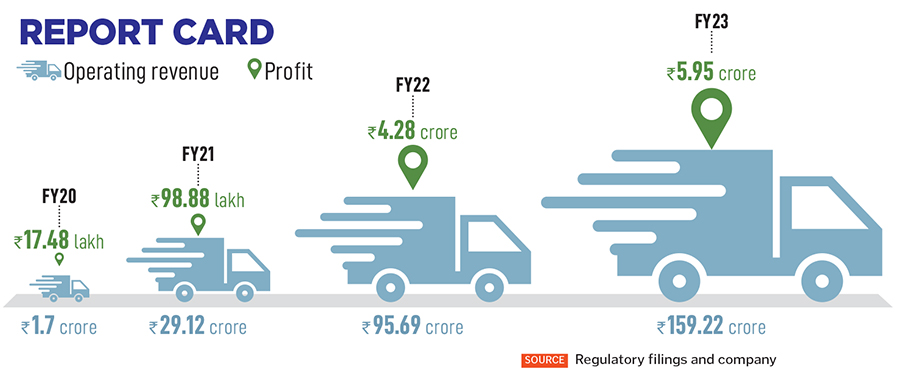
Shailesh Kumar's shoe-string upbringing and the curious case of CABT Logistics
After two flop ventures in cabs and ecommerce, Shailesh Kumar joined Flipkart as a delivery boy in 2017. Six years later, the village boy from Smastipur, Bihar has built a Rs150-crore logistics company
 Shailesh Kumar, founder & CEO, CABT Logistics, with his mother in the courtyard of the house he was born in, in Morwa Raytol in Samastipur district, Bihar
Image: Madhu Kapparath
Shailesh Kumar, founder & CEO, CABT Logistics, with his mother in the courtyard of the house he was born in, in Morwa Raytol in Samastipur district, Bihar
Image: Madhu Kapparath
Samastipur, Bihar. The math teacher was about to introduce two new concepts. “You can change the orders, but it won’t alter the sum or the result,” contended the tutor, explaining the commutative property of addition in algebra. If you add four to two, he shared an example with a bunch of attentive students in a state-run municipal school, you will have the same result as when you reverse the order. Similarly, a change in the order of a group of numbers doesn’t change the sum. “This is an associative property of addition,” he underscored. A few students looked perplexed.
The perceptive quality helped the lad during his formative years in Samastipur, his hometown in Bihar. Over three-and-a-half decades back, Samastipur was a quintessential small town in an overwhelming agrarian set-up of Bihar. Life would move at a leisurely pace, the aspirations of the students would either be to become a doctor, an engineer or at best join a state government service, and the happiness quotient would always top the chart on the ‘things-to-seek list’. “Life was calculated, and so was the ‘risk and reward’ ratio,” he says.
 Growing up in a one-room house with five occupants—Kumar had three siblings—the young lad clearly understood that education was the only key to upgrade his quality of life. With a modest monthly income of ₹1,400, his father did his best to take care of the family. “We were always strapped for resources,” he says. Born in 1986, Kumar grew up listening to the underdog story of the Kapil Dev-led Indian cricket team which lifted the World Cup in 1983. “He took the risk of thinking of making a career in cricket, and he got amply rewarded,” he says.
Growing up in a one-room house with five occupants—Kumar had three siblings—the young lad clearly understood that education was the only key to upgrade his quality of life. With a modest monthly income of ₹1,400, his father did his best to take care of the family. “We were always strapped for resources,” he says. Born in 1986, Kumar grew up listening to the underdog story of the Kapil Dev-led Indian cricket team which lifted the World Cup in 1983. “He took the risk of thinking of making a career in cricket, and he got amply rewarded,” he says.Meanwhile, in Kota, Rajasthan, Kumar was crystal clear about the risk and reward. After finishing his secondary schooling, Kumar dashed to the coaching hub to prepare for IIT. The risk was losing a year or so if he couldn’t make it in the first attempt, and the reward was a rewarding future. Well, the aspirant couldn’t make it, came back to Bihar, and prepared for other engineering examinations. That too didn’t work. His father forced him to take admission in Punjab Technical University, and Kumar completed his BTech in 2011. The next challenge was to clear the Graduate Aptitude Test in Engineering (GATE), which he did, but the gates to a golden future remained shut. Poor marks and low ranks meant one thing: He had to start from scratch.

A few quarters later, Kumar had calculated his risk, and reward. After a few quick job stints—the first didn’t work out as he was deemed overqualified, and got frustrated; the second was stressful as he didn’t get paid for four months; with just ₹17,000 per month, the third was not worth pursuing for long—Kumar landed a ₹32,000-a-month job at Dell. His cab driver, though, used to earn ₹60,000 every month. This made the young engineer think of avenues to make quick money, and starting a cab service looked promising and rewarding. In October 2013, he took a loan, bought a Toyota Innova, and after two weeks, he got to know the risk. His cab got stolen from Gurugram. “My salary was ₹32,000, and the EMI of the car was ₹29,800,” he says with a smile.
Also read: iD Fresh Food: Inside PC Musthafa's dosa-idli batter empire
 The cab business, though, soon came back on track. After a few months, the car was recovered, Kumar joined Yatra.com as a vendor, and he took more loans and borrowed from friends to buy more cars to expand the fleet. All went well for a few months, and then came the Supreme Court verdict banning diesel-run vehicles in Delhi NCR. Though Kumar’s business was largely unaffected due to new cars in his fleet, the sudden regulatory change made him rethink about a business that was tied to external factors. “I decided to change track,” says Kumar, who also found a new job at HCL.
The cab business, though, soon came back on track. After a few months, the car was recovered, Kumar joined Yatra.com as a vendor, and he took more loans and borrowed from friends to buy more cars to expand the fleet. All went well for a few months, and then came the Supreme Court verdict banning diesel-run vehicles in Delhi NCR. Though Kumar’s business was largely unaffected due to new cars in his fleet, the sudden regulatory change made him rethink about a business that was tied to external factors. “I decided to change track,” says Kumar, who also found a new job at HCL. Kumar’s next side gig was an ecommerce venture. From T-shirts to shoes to electronics and headphones, Kumar bought goods from wholesale distributors, and started selling them online. The business bombed. Why? The naïve founder failed to figure out the high cost of reverse in ecommerce. The cost of returning the unsold goods was much more than their cost price. “I failed to realise that logistics could play such a big role in the venture,” laments Kumar. As unsold inventory started piling up, losses ballooned, and Kumar pressed the exit button. With zero capital reserve and a pressing need to keep the fire burning, Kumar joined Flipkart as a delivery boy in 2017. “When I got married, I was a manager at HCL. Within months, I was a delivery boy,” he says. Over a year later, he rolled out his own intra-city logistics firm CABT (creativity at best technologies) Logistics in 2018.

Cut to November 2023. The delivery boy from Flipkart has built a bootstrapped delivery business, which clocked close to ₹160 crore in FY23. When put in context, the CABT story looks like a fairy tale: From a paltry ₹1.7 crore in FY20 to a staggering ₹159.22 crore in FY23; from 40 employees in 2019 to over 2,000 now; and from delivering across a handful of cities to covering 23 states and over 12,000 pin codes in 2023.
 The journey, though, had its share of hiccups. For at least close to three years, Flipkart was the biggest and dominant source of business. Overdependence had its flip side which got exposed during the end of 2020. The big task to diversify the business and add more clients started from 2021 onwards. The second big challenge came from well-funded rivals who started poaching from Kumar’s team. The bootstrapped company found it hard to keep its flock together. Some left, many stayed back. Kumar, for his part, doesn’t feel that staying bootstrapped was a handicap when it came to fighting the big boys in the market. A funded startup, he underlines, will also pay its team at the end of month, and so will a non-funded venture. If the inputs remain the same, Kumar explains, the output will be the same even if you rejig the inputs. “This is the commutative property of addition, which I learnt in school but understood when I started CABT,” he says.
The journey, though, had its share of hiccups. For at least close to three years, Flipkart was the biggest and dominant source of business. Overdependence had its flip side which got exposed during the end of 2020. The big task to diversify the business and add more clients started from 2021 onwards. The second big challenge came from well-funded rivals who started poaching from Kumar’s team. The bootstrapped company found it hard to keep its flock together. Some left, many stayed back. Kumar, for his part, doesn’t feel that staying bootstrapped was a handicap when it came to fighting the big boys in the market. A funded startup, he underlines, will also pay its team at the end of month, and so will a non-funded venture. If the inputs remain the same, Kumar explains, the output will be the same even if you rejig the inputs. “This is the commutative property of addition, which I learnt in school but understood when I started CABT,” he says.Founders from small towns, reckon experts, are usually unrelenting in their pursuit of success. “Well, they haven’t had much during their growing up years. So, they have a high level of desperation,” says Rajan Gahlot, assistant professor at the University of Delhi. Most of them have lived a rock-bottom life, so they shun the low-hanging fruit and display high risk in trying to maximise their bets. “The fear of failure doesn’t cripple them,” he adds.

Kumar, meanwhile, believes that a shoe-string upbringing prepared him to endure tough times during his entrepreneurial gigs. “Do you know why people from Bihar have a good track record in cracking civil services?” he asks. “They know they don’t have an option. They have to do it,” he signs off.
(This story appears in the 15 December, 2023 issue of Forbes India. To visit our Archives, click here.)


















